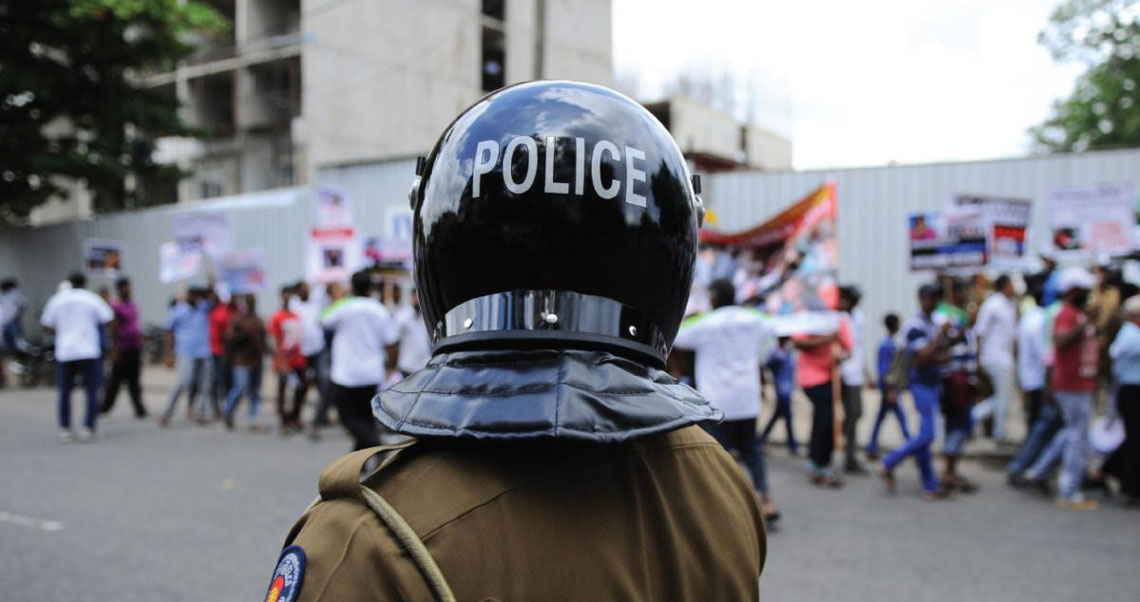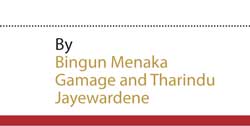30 Mar 2018 - {{hitsCtrl.values.hits}}

Especially the senior cadres of the commission and the senior police officers seem to be frustrated over the actions and intermediation of IGP Pujith Jayasundera
During these instances the Police Commission hadn’t provided redress to the grievances of those affected
Everybody was puzzled as to how it was illegal to take into custody a lorry that was transporting timber without a permit
The Constitutional Council so appointed establishes the Police Commission in accordance with clause number 155 of the Constitution
As far as the law is concerned the Commission is answerable to the Parliament and not to the Minister
Therefore the present Police Commission takes decisions regarding matters that cover grades above ASP
Law and Order has become the most controversial subject the Yahapalana Government has had to deal with for the past three years. Very recently A. Ranjith Madduma Bandara took over as Minister-Law and Order.
When handing over this Ministry, which till then came under the purview of Ranil Wickremesinghe, to Bandara the Premier gave specific instructions to the new Minister to compile a report on the National Police Commission and its working.
The Premier had stated that the commission in the past had been gearing up only when there were shortcomings, which was due to the absence  of a practical methodology. This statement by the Premier had led to a dialogue among legal experts on the Constitution and the legality of the Minister concerned having power to investigate into the affairs of an independent commission.
of a practical methodology. This statement by the Premier had led to a dialogue among legal experts on the Constitution and the legality of the Minister concerned having power to investigate into the affairs of an independent commission.
However notwithstanding these factors there were many articles written on probing and exposing the activities of the Police Commission. Such articles on several occasions hitherto had failed to attract the attention of the commission. This revealed the lackadaisical attitude of the commission towards public complaints.
This investigation is based on the situation that has arisen regarding the internal activities of the Commission which are now challenging its existence as an independent institution.
The 19th Amendment to the Constitution empowers the Constitutional Council to appoint members to all other Commissions. The Constitutional Council chaired by the Speaker includes the Prime Minister and the Leader of the Opposition as ex-officio members. On the recommendation of the Prime Minister and the Leader of the Opposition, five members (two of whom are Parliamentarians) are appointed by the President. A Member of Parliament, not belonging to the political parties or independent groups which represent the Prime Minister and the Leader of the Opposition, but accepted jointly by other parties in the Parliament and appointed by the President is also included. The Constitutional Council so appointed establishes the Police Commission in accordance with clause number 155 of the Constitution. Accordingly the Police Comm

ission consists of seven members appointed by the President on the recommendation of the Constitutional Council.
From the members appointed, one should be a retired police officer in the rank of a Deputy Inspector General of Police. The chairman of the Police Commission is appointed from among the members of the commission by the President on the recommendation of the Constitutional Council.
The present Chairman of the Police Commission is P.H.Manatunge. The other members include Prof. Siri Hettige, Attorney Savithri D. Wijesekera, B.A. Jeyanathan, Y.L.M. Zavahir, Thilak Collure, and Dr Frank De Silva.
The complaints that are received by the Police Commission includes Public Complaints on injustices caused to citizens by the police and injustices caused to the members of the Police Force by the Police. Even on an earlier occasion these writers had highlighted the same subject with regard to the injustices caused to the public. During these instances the Police Commission hadn’t provided redress to the grievances of those affected. This time the report is on the injustice suffered by an Inspector of Police owing to a delay in the investigations regarding his appeal.
The Sub Inspector was acquitted of charges made against him. From that day the DIG concerned started taking revenge on the Sub Inspector
He had joined Sri Lanka Police as a Sub- Inspector and served in a number of police stations. On being promoted as an Inspector, and while serving as the OIC of a police station in the South, he had taken into custody a lorry transporting Timber without a permit. This was following a tip-off he had received.
This incident was followed by a call from a DIG who had ordered him to release the stock of timber. As the investigations had already commenced under legal provisions, he had rejected the particular order and informed the incident to a Senior DIG, who in return instructed him to take appropriate legal action. Accordingly the suspects were produced in courts.
Just a few days passed and the Sub Inspector was arrested by a team of police officers on charges of illegally taking into custody a lorry transporting timber. Everybody was puzzled as to how it was illegal to take into custody a lorry that was transporting timber without a permit. The owner of the lorry had shown a permit later which appeared to have been obtained after the lorry was taken into custody.
The Sub Inspector was produced in courts and during the hearing the evidence proved that the Sub Inspector had taken the lorry into custody legally. The Sub Inspector had mentioned in his statement that he had obtained confirmation from the officers at the Divisional Secretariat that a permit hadn’t been issued for the lorry to transport timber at the time of the arrest. The Sub Inspector was acquitted of charges made against him. From that day the DIG concerned started taking revenge on the Sub Inspector. He was deprived of promotions and under the tenure of the present IGP he was demoted to the grade of Inspector from the grade of Chief Inspector. All these maneuvres were made even without a basic inquiry. He lodged a complaint with the Police Commission and his appeal was held back for more than one and half years. The reason given for this was that the IGP’s report hadn’t been received. Meanwhile the IGP had taken steps to frame bogus charges and terminate his services from the department of police. The police officer concerned took steps to make an appeal. This too dragged on for more than one and half years. However he didn’t give up. Despite being frustrated he continued in his pursuit of resorting to legal avenues. After two years he returned to his job and was reinstated in the post of Chief Inspector. The administrative authority had ordered that the officer be assigned the post of ASP. However he has not received the increments that he was denied of.
He had made another appeal in this regard and one year has lapsed without him receiving a reply. It is not worth when a period spanning one to two years of an individual’s life is filled with anguish. Such individuals await in vain hoping for a response; something that would never see the light of day. Who is to blame in this regard? Why have commissions if the grieved parties are forced to waste time?
This is only one story, but there are many similar episodes kept in abeyance for want of space.
The Police Commission meets regularly every Thursday. The appeals taken up at the last meeting were postponed
What we are trying to infer is that the motive behind the establishment of the Police Commission appears to be derailed, humiliating the members of the police. Especially the senior cadres of the commission and the senior police officers seem to be frustrated over the actions and intermediation of IGP Pujith Jayasundera in the decision making of the Police Commission. The IGP isn’t a member of this commission and therefore he has no voting power at the meetings of the commission. He has the right to attend the meetings as outlined by the Constitution Council. According to internal sources the IGP is appearing to be misusing this right to attend the meetings.
The quorum at these meetings is four. Decisions are taken based on the majority vote and at any crucial time the individual who chairs the meeting has the right of a decisive vote. Internal sources also reveal that though the IGP has no vote his behaviour underscores there was interference on his part in voting in arriving at certain decisions.
This has resulted in the delay of responding to appeals. The Police Commission meets regularly every Thursday. The appeals taken up at the last meeting were postponed. They had said that the appeals would be subject to further reconsideration. The main reason was the non-submission of reports by the IGP in relation to these appeals. Few examples are: Number 2885/91/29 June/2017 SI G. Wilfred Silva, number3367/112/09th November/2017PC 46919 H.M. Gamini. Ranasinghe, 3504/115/30th November/201/PC C.M. Ransinghe, number 2475//89/ 20th June/2017 SI S.M.S. Sisira, number 2485/89/20th June/2017 Police Inspector U.W. Senevirathne, number2574/91/ 29th June/2017 PC S. Nimal Shantha, number 2892/100/24th August/2017 Police Inspector Sivaraman Shivakumar, number 3208/107/ 04th October/2017 and 3705/119 SI K.L.G. Pushpakumara Perera.
The Police Commission could confer on a committee its powers and authority on disciplinary matters and transfers or promotions of Police Officers in grades identified by the commission according to the Constitution. Therefore the present Police Commission takes decisions regarding matters that cover grades above ASP. This authority is again vested with the IGP by a Gazette notification. This limits the number of appointments and promotions that now come under the ambit of the Commission to about 3000 out of a number of above 80,000.
From among them 3000 senior police officers who are second only to the IGP made an appeal to the Commission to take over the administration of the Police Department. The Police Special Investigation Unit established to inquire into the wrong doings of police officers has now become a cat’s paw, used by interested parties to facilitate their own private agendas. This fact was stated before the Commission by senior DIG’s themselves. Even then it appears that this Commission is yet to understand its priorities. Therefore it’s evident that a group of senior officers are contemplating complaining directly to the Constitutional Council shortly.
They are also getting ready to bring to the notice of the Council, the telephone calls that are being made to a senior person of the Commission, by a powerful Minister.
Meanwhile a group of permanent employees of the Police Commission had also addressed a petition to the Auditor General, requesting for a justifiable investigation on the administration and finance control of the Police Commission. They allege that the Commission appointed under the 19th amendment to the Constitution had failed to achieve its objectives and charge that the Commission has now turned into a white Elephant, devouring public funds.
The Police Special Investigation Unit established to inquire into the wrong doings of police officers has now become a cat’s paw, used by interested parties to facilitate their own private agendas
They further charge that by unnecessarily renting out a number of rooms at the BMICH, a colossal sum of money is spent monthly as rent. Some rooms obtained on rent are used only for short periods of time. At the time of the establishment of this Commission, in 2015, there were only 25 staff members. The staff now exceeds100. The appeal boards are also in an unsatisfactory state. It’s apparent at a glance that most of these appeals are likely to get rejected as many have lapsed and some of the victims have left the service.
It’s evident that the powers of the commission, its objectives and in setting out operations had all gone haywire. As far as the law is concerned the Commission is answerable to the Parliament and not to the Minister. The Annual Reports of its working are compiled on that basis. Our sister paper had on many occasions pointed out the serious lapses of the Commission, but they failed to wake up the authorities from deep slumber.
It’s pertinent to mention that UN Activists on a recent tour to the island held a press briefing and stressed that the Police Commission is not stable. Ose Guvera, a member of the group, emphasized that arbitrary detentions and torture by the police should have drawn the attention of the Commission and they should strengthen the procedure in conducting investigations into such matters. This newspaper is only striving to depict only a single profile of the Police Commission.
The above foreign activists collected much details during their stay, which lasted 11 days, in the island, and expected to present their findings to the UNHRC at their sessions scheduled for September.
If the authorities are really keen on this matter they have another five months to pull their socks up!
According to Media spokesperson of the Police Commission
G.D. Liyanarachchi the delay in receiving reports from the police was a matter that has been present for some time. “We directed the attention of the Police Commission to this issue. Accordingly we sent reminders from time to time. Finally we summoned the IGP and after a discussion suggested a definite date before which the relevant reports should be sent. We discussed this matter with the DIGs too. We will continue to strive in obtaining these reports from the IGP without any delay” said Liyanarachchi.
Many individuals claim that when requests are made to obtain information from the Police Commission that there is no reply. With the intention of obtaining veracity, we too directed a request for information from the Police Commission to which too there wasn’t a reply. When an inquiry was made over the phone the reply was that the request has been received. After having waited for nearly a month, another inquiry was made, to which the reply was that if information had not been received the grieved parties should make an appeal. An information officer’s duty is to reveal the information and not to hide it. If they are unable to provide the information requested for they should accept this inability in writing. But it appears that it is not relevant to the Police Commission. An appeal was submitted in writing to the mentioned officer of the Police Commission, but there was no reply till this edition went to print.
Courtesy - ලංකාදීප
24 Nov 2024 7 hours ago
24 Nov 2024 24 Nov 2024
24 Nov 2024 24 Nov 2024
24 Nov 2024 24 Nov 2024